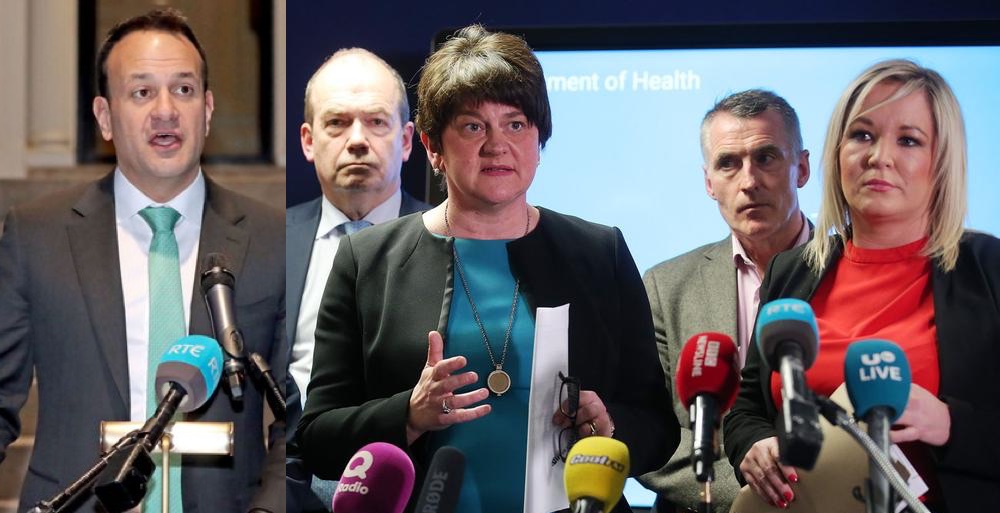
Efforts to contain the spread of Coronavirus have become dangerously split across the island of Ireland after a division emerged between governments in Dublin and London on how quickly the virus should be allowed to spread.
Tory Prime Minister Boris Johnson has set out relatively minimal efforts to tackle the virus, mainly aimed at preventing Britain’s National Health Service from becoming completely overwhelmed.
His economically-minded ‘laissez faire’ strategy has recalled Victorian arguments which allowed famine and disease to take hold in colonised Ireland during the 1840s without government intervention.
Nevertheless, it is that low key approach that is currently being followed by the Stormont administration as it deals with the coronavirus in the Six Counties.
But the 26 County Taoiseach Leo Varadkar, speaking in Washington, has announced stronger efforts to tackle the disease in the South. He announced measures including the closure of all colleges and schools, unlike in the North and Britain, where they remain open.
Varadkar and his government were responding to pressure from the public to take action after initially appearing to allow the virus take root in the state unchecked. Dublin officials are now being urged to more aggressively embrace ‘social distancing’, which cuts down on human interaction and economic activity. It has proven highly effective in curtailing the spread of the virus in a number of countries, particularly in Asia.
Strong restrictions on public life have helped China, where the disease began and which has sufferd over 3,000 deaths, to reduce the number of new cases to a trickle.
Italy has become the official new epicentre of the disease, where the death toll has reached 1,266. However, the situation is also spiralling out of control in Spain and to different degrees in other EU countries, including Ireland.
The first Irish death from the disease took place on Wednesday. The victim was identified only as “a woman in the east”. The number of cases in both parts of Ireland is now at 119 and rising exponentially.
After weeks of delay, the Dublin government finally announced a limited number of social-distancing measures for a period of two weeks. Apart from closing schools, colleges and creches, museums, galleries and other public buildings are closed. There are visitor restrictions at hospitals, nursing homes and prisons, and a ban on large gatherings, including some St Patrick’s Day events.
Dublin government officials also finally agreed to ask people coming back from Italy and Spain to “restrict their movements”. It was a belated acknowledgement that their failure to tackle the influx of the disease from Italy was the main source of the disease entering Ireland.
Gaelic sports and other sports events have been cancelled, as well as most church service, but there is no restriction on pubs, restaurants, shopping or smaller events and gatherings. And despite considerable public concern, no measures will be taken with regard to people returning to Ireland from this week’s racing festival Cheltenham in England.
Acting Tanaiste Simon Coveney admitted on RTE news on Thursday night that the new measures are intended only to slow down the virus. This means that officials are not seeking to contain the disease, despite some badly affected Asian countries having achieved this.
Medical experts have warned the new measures may still not even be enough to prevent a health management crisis. They have predicted “challenging” decisions for hospitals over who receives life-saving intensive care treatment.
Announcing the measures during his much-curtailed St Patrick’s Day visit to Washington DC, Taoiseach Leo Varadkar (left) admitted older people and those with chronic diseases are now at real risk.
“We have not witnessed a pandemic of this nature in living memory,” he said. “This is uncharted territory.”
“You should continue to go to work if you can but where possible should work from home,” he advised. “Together we can slow the virus in its tracks and push it back. Acting together, as one nation, we can save many lives.”
However, in the North, schools and colleges will controversially remain open. The decision to deviate from the South was announced at a hastily-arranged press conference (right) at Stormont by a number of Six County Ministers, including DUP leader Arlene Foster and Sinn Féin’s Michelle O’Neill.
The announcement came shortly after the Taoiseach’s announcement in Washington, and Arlene Foster said she was “disappointed” Leo Varadkar had not provided more notice of the move. She insisted the North would “follow the scientific advice” provided by London.
Behavioural psychologists in England have justified holding off on ‘shutdowns’ on the basis that the public cannot be counted to abide by heavy restrictions for an extended period. More controversially, some Tories have also argued against disruption in favour of a “cull” or “thinning” to achieve “herd immunity”, when the surviving population has recovered from the disease and can safely return to work. Leaving schools and colleges open, at least initially, forms part of that strategy.
But after public demand in the North for the schools to be closed, Michelle O’Neill said she agreed. “People are rightly concerned about the impacts on their families and their children and as a parent, I share those concerns and I have been contacted by many parents who did not send their children to school this morning,” she said.
“To protect the public, schools and colleges should now be closed. There has been contradictory medical evidence and in that context my view is that we should err on the side of caution.”
![[Irish Republican News]](https://republican-news.org/graphics/title_gifs/rn.gif)
![[Irish Republican News]](https://republican-news.org/graphics/title_gifs/harp.gif)

